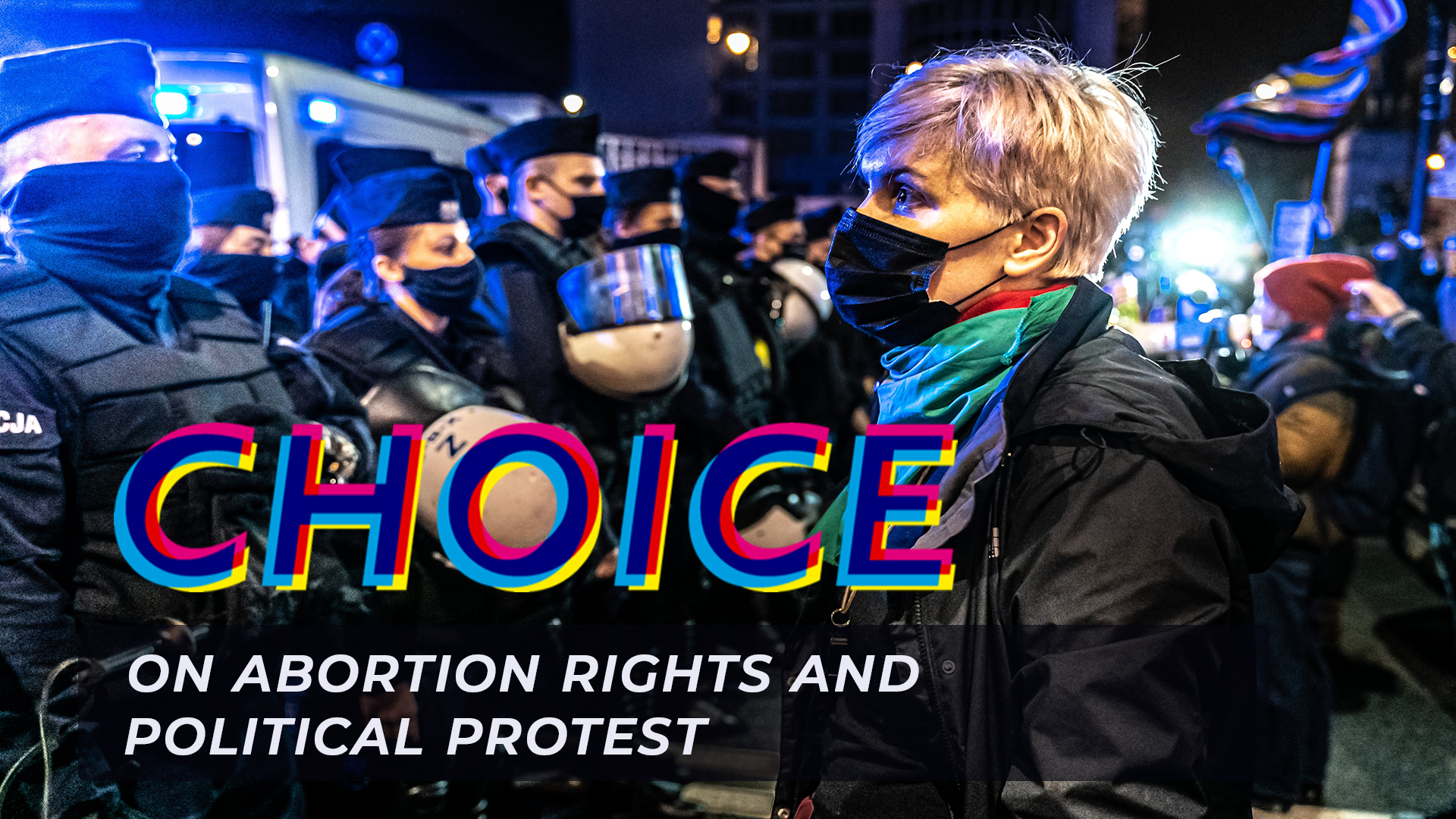Fotos: Titel, Piotr Jaxa; Irland, Mareike Graepel; Sri Lanka, Isabel Robson; Colombia, Insa Rudolph; Poland, Silke Merzhäuser; Netherlands, Sarah Tekath; Namibia, Lisa Ossenbrink; Deutschland, Silke Merzhäuser; Argentinien, Marina Rosenzvaig; Deutschland Ost-West, Silke Merzhäuser; USA, Marietta Steinhart

For the first time werkgruppe2 publishes a research for listening. In a podcast series we interview experts in Ireland, Sri Lanka, Colombia, Poland, the Netherlands, Germany, Argentina, Namibia and the USA. The podcasts are created in collaboration with DEINE KORRESPONDENTIN, a online magazine and network of freelance journalists from all over the world.
How is the right to abortion currently regulated in these ten countries? What does the practical implementation look like, where are the barriers, ambiguities and the need for action? Who are the feminist activists and what are they fighting for? Where is resistance? How does the right to abortion correspond with other social movements?
Abonnieren:
#1: IRELAND
An astonishing turn occurred in Ireland in 2018. In the strongly Catholic country, the ban on abortions was refused by referendum and has been legal up to the 12th week of pregnancy since then. We speak to author and journalist Una Mullally, who edited REPEAL THE 8TH ANTHOLOGY, a collection of writings, poems and photographs that captured the force of the campaign for reproductive rights in the country in 2018. She is a columnist for The Irish Times. Also joining from Ireland is the German foreign correspondent and journalist Mareike Graepel of the network DEINE KORRESPONDENTIN.
"Once you break the silence, you kind of break the stigma and once you break the stigma, you kind of break the shame.“ (Una Mullally)
#2: SRI LANKA
In our second episode, we will be talking about Sri Lanka. Our guest is Sonali Gunasekera, director for advocacy at the Family Planning Association in Sri Lanka. Sonali has a wealth of experience working in the field of Sexual and Reproductive Health, Child Protection and Gender and Advocacy related activities. Previously she worked at the Child Fund Sri Lanka, Oxfam GB Sri Lanka, the International Labour Organisation and Save the Children Sri Lanka and is joining us from Colombo. Also with us in Mumbai is South Asia correspondent and author, Natalie Mayroth, from the network Deine Korrespondentin. The abortion laws on the island are among the most restrictive in the world and have not been changed since the colonial area. According to estimates, hundreds of women a day take risks with illegal terminations due of lack of access to professional assistance or money. "Sri Lanka is not ready for the change....Women have to look after their own bodies.“ (Sonali Gunasekera)
#3: COLOMBIA
In this episode of CHOICE we are focussing on abortion rights in Colombia. We are talking to Mónica Roa, a Colombian Lawyer for Human Rights. She is founder and director of the organization BRIDGES and has been working for Women’s Link Worldwide for more than 12 years. In 2006 she became a public figure when she filed a constitutional lawsuit that resulted in the liberalization of abortion laws in Colombia. Our second guest is Franziska Pröll - a freelance german Journalist that – during the last year - has been reporting from Colombia on social an educational topics, amongst others for or the german newspaper Frankfurter Allgemeine Zeitung and ZEIT online.
„Reproductive rights means that YOU are the one that gets to decide if you want to use contraceptives, if you want an abortion or if you want to have a child. And the state cannot impose that decision on you. During those years of conflict women within the guerrilla were being forced to have abortions, women outside the guerrilla in urban life were being prohibited to have an abortion - in both cases the state was not protecting or respecting our reproductive rights.“ (Mónica Roa)
#4: POLAND
This episode is about abortion rights and political protest in Poland. The idea for this podcast series came about under the impression of the strong protests in Poland in autumn 2021 against the tightening of the already restrictive legislation on abortion. Only since 1993 abortion is mostly ban and this happened during the change of social system, which promised more liberal rights and gave the hope of freedom.
Now in 2020/21 the amount of protesting women (but also men) in autumn was very impressive. We want to know: how did they manage to mobilize so many people? We talk to Karolina Micula, a musican, performer and activist, who chooses many different forms of protesting (and is pictured on the front page of the podcasts’ website). Our second guest is Terry Reintke, member of the European Parliament for the Green Group since 2014 and currently also its Vice President. She demands that the EU intervenes in Polish breaches of fundamental rights and supports the Polish activists by saying „Your struggle is our struggle.“
#5: NETHERLANDS
In the episode we want to talk about the right of self-determination over the body and what it looks like in the Netherlands, how the continuation of the current liberalization can be guaranteed and what future goals could be.
Our guests are Devika Partiman, a social activist that has founded the STEM OP EEN VROUW foundation, which aims to get more women into political positions. Also with us is Sarah Tekath, journalist, based in Amsterdam since 2014. She works for different medias like euronews, FAZ, neues deutschland and is the podcast host AMSTERDAMES and member of the network DEINE KORRESPONDENTIN.
“Shouldn’t we not be patient, shouldn’t we not be happy with that we have?
There is still be a big lack of understanding. I think the educational system still does not explain why the feminist movement was there. They tell pupils, women were not allowed ot vote, they were not allowed to go to school. But they don’t learn the mechanics of the discriminating system. How all the details are go to show their faces everywhere you go.” (Devika Partiman)
#6: NAMIBIA
In Namibia the abortion law is very strictly regulated – but last year in July a young, committed movement of activists started a petition that caused quite a stir. In our new episode we talk to Ndiilokelwa Nthengwe, a Namibian activist, who has been at the forefront of the #ShutItAllDown Movement and the equal rights protests in Windhoek. She is also the co-founder of the Voices and Choices for Rights Coalition which started the petition to legalise abortion in Namibia. Also with us is multimedia journalist Lisa Ossenbrink. She reports on people, power and populism from Europe and Sub-Saharan Africa and has been published by Al Jazeera English, VICE World News and Deutsche Welle. She is a member of the network DEINE KORRESPONDENTIN. "Silence is also another tool of power and that is because silence can also maintain the power systems that continue to subjugate and even remove the agency of adolescent girls, young women and gender diverse persons. There is definitely a culture of secrecy, of silence in our country.“ (Ndiilokelwa Nthengwe)
#7: Deutschland
In dieser Folge sprechen wir über das Recht auf Abtreibung und Formen des Politischen Protests in Deutschland. Wir möchten genauer befragen, warum es in Deutschland ein – im Vergleich zu anderen europäischen Ländern – restriktives Recht gibt; Schwangerschaftsabbruch nicht legal, sondern unter bestimmten Bedingungen nur straffrei ist, und warum der Zugang zu sicheren Abbrüchen immer schwieriger wird.
Unsere Gäste sind heute die beiden Medizinerinnen Jana Maeffert und Alicia Baier, die 2019 Doctors for Choice Germany e.V. gegründet haben. Zu ihren Aktionen gehört z.B. die Kampagne www.mehralsdudenkst.org oder www.schwangerschaftsabbruch-zuhause.de.
Mit uns spricht und fragt heute die Journalistin Meredith Haaf, die für die Süddeutsche Zeitung u. a. über Geschlechterfragen schreibt.
„Ich wünsche mir ein Ende der Scham, dass wir als Ärztinnen uns nicht schämen müssen und auch die Betroffenen Frauen nicht. Und, dass wir nicht darüber reden, wie die 100.000 Betroffenen Frauen in Deutschland nicht weniger werden, sondern, dass es diesen 100.000 auch gut geht. Denn das werden nicht weniger.“ (Jana Maeffert)
#8: Argentinien
In Argentinien wurden Ende Dezember 2020 Schwangerschaftsabbrüche legalisiert. Die Erzählung vom Erfolg der Reformen ging um die ganze Welt und ist seitdem Ansporn für Aktivist*innen rund um den Globus. Wir möchten erfahren, wie es gelungen ist das Abtreibungsrecht in Argentinien zu ändern, wie die Umsetzung in der Praxis gelingt und welche Widerstände es auch jetzt noch gibt. Dazu sprechen wir mit der Künstlerin und Aktivistin Marina Rosenzvaig aus Tucuman, dem Norden von Argentinien, und mit der Journalistin Anne Herrberg, die seit 2011 Jahren in Buenos Aires lebt und für die ARD aus Südamerika berichtet. „Das waren 30 Stunden Parlamentsdebatte, die auf Großleinwänden auf die Straße übertragen wird. Ein konstantes Bibbern und Mitfiebern. Ich glaube, ich habe noch nie erlebt, dass Politik so lebbar und so partizipativ war wie in diesen Momenten.“ (Anne Herrberg)
#9: Deutschland Ost-West
„Ich bin der Meinung, dass der Schwangerschaftsabbruch außer strafrechtlich geregelt sein sollte, und der §218 im Strafgesetzbuch auf den Müllhaufen der Geschichte gehört.“ (Ulrike Busch)
Wir sprechen ein zweites Mal über das Recht auf Abtreibung und Formen des Politischen Protests in Deutschland. Noch einmal möchten wir aus einer anderen Perspektive nachfragen, warum es in Deutschland ein relativ restriktives Recht gibt. Wie kommt es, dass Anfang der 90er Jahre für kurze Zeit die in der DDR geltende Fristenlösung als gesamtdeutsches Recht im Raum stand, diese Option aber recht bald durch das Verfassungsgericht verworfen wurde und was bedeutet das? Wie sah die Fristenlösung in der DDR aus und was bedeutete diese für ungewollt schwangere Frauen.
Zu Gast in unserem Podcast ist heute Ulrike Busch. Sie war Professorin für Familienplanung an der Hochschule Merseburg sowie Mitbegründerin und langjährige Geschäftsführerin des Familienplanungszentrums Berlin.
„Die Folgewirkungen, die der §218 in sich trägt sind so verheerend und haben sich in den letzten 20-25 Jahren in ihrer Breite entfaltet – der §219a ist der sichtbarste Aspekt davon. Ohne eine Streichung des §218 bleiben solche unguten Kompromisse in ihrer Wirkmacht bestehen.“ (Ulrike Busch)
#10: USA
“DIRTY DANCING remains a favorite film in 1987 and it’s funny that people forget that the movie is about abortion. The characters have no other motivation driving forward than helping someone to get an abortion. The whole reason why BABY is going to dance is to recover for PENNY so that she can get an abortion.” In this episode we talk about abortion rights and political protest in the United States and about films and series.
Our guests is Gretchen Sisson, a qualitative sociologist whose research focuses on social constructions of parenthood, specifically examining teen pregnancy and young parenthood, infertility and assisted reproductive technologies, and adoption and birth motherhood. Her current research focuses on representations of abortion and reproductive decision-making in popular culture, including film and television. She is working in the collaborative research group “Advancing New Standards in Reproductive” at the University of California in San Francisco.
Also with us is the New York City based film critic and journalist Marietta Steinhart. She is a member of the network DEINE KORRESPONDENTIN.
ABOUT
werkgruppe2 has been developing documentary storytelling projects for over 10 years, often theater productions or film projects. Based on extensive journalistic research, they create atmospheric and narrative formats that explore the boundaries between documentation and fiction. Always asking questions about what documentation means, how reality is depicted and how can people speak and feel on behalf of people?
Most recently they worked on topics as the social decline of women in working-class families, weight discrimination and the hospital murders in Oldenburg and Delmenhorst.
werkgruppe2 are the director Julia Roesler, musician and composer Insa Rudolph, videographer Isabel Robson and dramaturge Silke Merzhäuser.
GEFÖRDERT DURCH:



